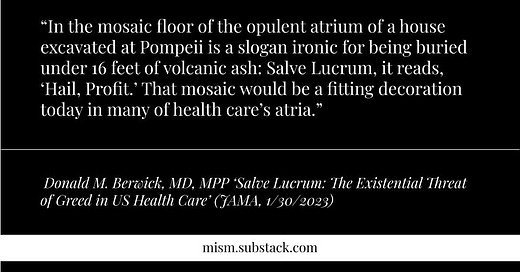Behind the mix of metaphors across my Substacks, most of my published and unpublished work is fundamentally about one thing: health. It's also about the urgent need to protect our health from the unchecked — often, unchallenged — proliferation of institutions and ideologies that enshrine lethal misconceptions about the meaning of this word.
To protect health from lethal ideologies, we must at least learn to convert metaphorical speech into economic reality. By itself, this skill is insufficient. But it’s an essential skill. Without this skill, we're just mixing metaphors. Here, I cite two articles for readers cultivating this skill.
Money as Medicine
According to a recent article in NEJM — see Money as Medicine — clinical diagnosis overlooks eighty to ninety percent of “modifiable factors shaping health in the United States”. The overlooked “drivers of health and disease” should not be reduced to money, but they can't be divorced from money either. Under the theme of “Money as Medicine”, the article argues for Universal Basic Income (UBI) as a policy response to mitigate the effects of economic threats to health.
This hoped-for mitigation may never happen, but not because of the pros and cons of UBI or similar policy proposals. The problem may be seen as economic and amenable to economic remedies, but the resistance to these remedies is best seen as ideological, if not religious.
The value of NEJM article by Eric Reinhart is that it not only describes the problem but it also names the ideology that enshrines the problem as a solution. Reinhart's name for this idolatrous ideology is clinicism. I think it's an excellent coinage; in my view, clinicism is a context-specific expression of the virus of Second-Order Ignorance.
The Ideology of ‘Salve Lucrum’
In a JAMA article, Salve Lucrum: The Existential Threat of Greed in US Health Care, Donald M. Berwick, MD, MPP, writes:
In the mosaic floor of the opulent atrium of a house excavated at Pompeii is a slogan ironic for being buried under 16 feet of volcanic ash: Salve Lucrum, it reads, “Hail, Profit.” That mosaic would be a fitting decoration today in many of health care’s atria.
The grip of financial self-interest in US health care is becoming a stranglehold, with dangerous and pervasive consequences. No sector of US health care is immune from the immoderate pursuit of profit, neither drug companies, nor insurers, nor hospitals, nor investors, nor physician practices.
And
Greed harms the cultures of compassion and professionalism that are bedrock to healing care. Health care executives and board members who know better nonetheless feel compelled to play the games of pricing, acquisition, and revenue maximization that others do. Professionals find themselves trapped in record keeping, coding behaviors, and productivity imperatives that belie the reasons many went into health care in the first place. “Moral injury” is the harvest, with demoralization and disengagement to follow.
And
What to do about greed? No answer is easy, not least because of the political lobbying might of individuals and organizations that are thriving under the current laxity. The cycle is vicious: unchecked greed concentrates wealth, wealth concentrates political power, and political power blocks constraints on greed.
Perhaps the demoralization of professionals, the conflicted consciences of many executives, and the anger of the public represent potential political energy that, with proper leadership, can become kinetic.
Becoming Kinetic
If you see the problem, share this post.
If the two articles cited here raise questions in your mind, submit your questions to DaaS for a free public response.




